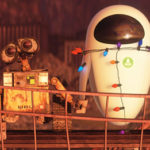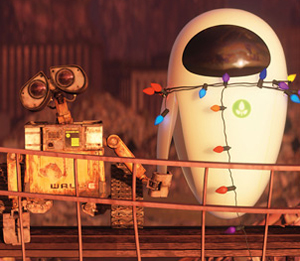Speculative Love, Part 4: Alien Love
 The issue was bound to come up once people started writing science fiction stories. You’ve got humans, you’ve got aliens, you’ve got robots–put them together in a dark room without parental supervision and you get…
The issue was bound to come up once people started writing science fiction stories. You’ve got humans, you’ve got aliens, you’ve got robots–put them together in a dark room without parental supervision and you get…
Eww.
It’s revolting, it’s fascinating, it’s gooey, it’s radioactive…It’s alien love!
Or something.
If you’re looking for a catalog of science-fiction’s multitudinous approaches to alien love, Star Trek is a great place to start, if only to learn the dimensions of the playing field. In this respect, the series in its various incarnations has fulfilled its promise to “Boldly Go Where No Man/One Has Gone Before.” Star Trek has explored inter-racial love, inter-species love, human-robot love, robotic procreation, human-vaporous entity love, homosexuality, transgenderism, male pregnancy, virgin birth, pheremone-driven sexual attraction, drug-enhanced sexual attraction…the list goes on. Human-alien hybrids and cyborgs are routine fare. Sometimes the intent is titillation (sex sells, after all), sometimes it’s simple curiosity (How would they…er, could they?), and sometimes it’s used as a metaphor for a question that’s central to the genre:
“What happens when we embrace the Other?”
The Other is anything that isn’t us. Someone of the opposite sex, or a different race, or another culture. Maybe it’s a new idea or a different way of interpreting the world. We might confront the Other when we move to the opposite side of the globe, walk across to the opposite side of the street, or face someone on the opposite side of a sales counter. What will happen?
1. The Other might expand our perceptions in ways we never thought possible, and together, we’ll create something new and wonderful.
2. The Other might reveal our worst prejudices and motivations.
3. The Other might engage us in battle.
4. The Other might consume us…or worse.
Star Trek is hopeful, by and large, so it prefers Option 1. Embrace the Other, and you get hybrid vigor, synergy, a whole that’s more than the sum of its parts. You get Spock. You get Deanna Troi. You get B’Elanna Torres. You also get the Borg, which sort of kills my point, but…oh, wait. You still get Seven of Nine. Sigh. Happier now.
 Thoughtful sci-fi might take us to Option 2, and we get to look at ourselves in the funhouse mirror of Alien Nation or District 9. The frontiers of our prejudices expand even as they remain fundamentally unchanged. We take alien refugees and do the sorts of things to them we’ve always done to immigrants until we get used to having them around. Who’s the monster now?
Thoughtful sci-fi might take us to Option 2, and we get to look at ourselves in the funhouse mirror of Alien Nation or District 9. The frontiers of our prejudices expand even as they remain fundamentally unchanged. We take alien refugees and do the sorts of things to them we’ve always done to immigrants until we get used to having them around. Who’s the monster now?
Action-oriented sci-fi often selects Option 3, which is a lot of fun, in a fast-food sort of way. It doesn’t stick with you, but it sure tastes good going down. Something like Mars Attacks. “Can’t we all just get along?” Well…no. As much as we’d like to share peace, love, and rock & roll with everybody, sometimes the Other just wants us dead.
The last option is the most disquieting. We fear embracing the Other means losing part or all of our identity. The Other makes us part of itself, changing us into something different, unrecognizable, as alien as it is. Something not…us. We see this expressed in stories like The Blob, The Thing, The Puppet Masters, Invasion of the Body Snatchers. And in the Bible.
The Bible?
Sure. In the story of Jesus, God turns the whole concept on its head. There’s more than a merger, there’s an Incarnation. God encapsulates Himself in humanity. The ultimate Other becomes one of us. He makes an unimaginable sacrifice, and it’s all because he loves us. Embracing that sacrifice involves the surrender of our will, but rather than losing our identity, we finally bring into reality who and what we’re meant to be. We become more ourselves–our true selves–than ever. The broken image of God we wear is repaired and renewed.
How’s that for alien love?













































My first thought with these four responses–River Song, the Doctor and the craziness of their relationship.
Rory: River was brainwashed to kill you.
The Doctor: Well, she did. And then she used her remaining lives to bring me back. As first dates go, I’d say that was mixed signals.
They pretty much define kiss/kill relationships
This is a point where I’m not sure I’d have thought much about things like cloning (Do they have souls, etc) without a story to help put it in the forefront for me. Just wouldn’t have been on my radar.
This is where I probably get a bit weird. And for the heck of it, I’ll throw some opinions out there (because some of this really is a criticism I have of the sci-fi genre).
I really do think AI/human “love” is weird, mostly because, no matter how hard I try to think otherwise, a robot is still a machine to me. Luke and Callista (dead girl’s spirit trapped in a ship’s computer) is bizarre to me.
As far as the ‘inter-species’ thing goes, the less physiological commonalities they possess the weirder it gets for me.
Just to point out DW, the Jenny/Vastra relationship (homosexuality aside for this comment–But, as a side note, it felt far, far less forced than every previous DW homosexuality reference) was, well, a lizard and a human (which, I like Vashtra a lot–she’s a very cool character. But let’s face it, the Silurians are cool). I kinda just had to not think about that much.
The Donkey/Dragon relationship in Shrek, just for the record, I just try not to think about. I’m not really sure Donkey/Dragon is biologically possible anymore than I think a robot/human is, anyway.
On the other hand, something like a Klingon/human relationship or Betazoid/human doesn’t bother me.
And maybe that’s where the line is, at least for me: How plausible is it? Course, like you said, in some cases that’s the question being raised.
And as it turns out, as you say…the dark side of human nature is terrible indeed…
To which I tend to ask, “So they’re technologically and intellectually superior to us, and the best solution to expanding an empire or generating new resources is to conquer and enslave/destroy other peoples on other planets? How in the name of all holy and profane does that make sense?”
But that’s probably my prejudice against power-mongers talking…
Kaci: I really do think AI/human “love” is weird, mostly because, no matter how hard I try to think otherwise, a robot is still a machine to me. Luke and Callista (dead girl’s spirit trapped in a ship’s computer) is bizarre to me.
Yeah, the AI/human pairing is a tough sell on a number of levels. At the very least, you need an AI that is plausibly sentient–self-aware, self-motivating, able to think abstractly on the same level of complexity as a human being. Is it a new order of life, or something that simulates life so well we can’t tell the difference? Star Trek TNG devoted an entire character arc to the exploration of this idea with LtCmdr Data. Similar issues emerge in Asimov’s robot stories (e.g., R. Daneel Olivaw in The Caves of Steel and later works), and in my childhood introduction to sentient robots, Osamu Tezuka’s Astroboy.
Anne McCaffrey’s The Ship Who Sang novels approach this from a different angle–they describe humans with genetic defects or incurable diseases wired into spaceships and space stations that effectively become their bodies. As they integrate into this new state of being, it becomes difficult to determine where the ship ends and the person begins. They fly with a normal human partner, and romantic complications can and do ensue. Romance is mostly a state of mind, after all.
Human/alien hybrids never bothered me much, either, despite all the genetic handwaving. I always saw it as a metaphor for conflicted human nature, and it’s usually played out that way–the human and alien natures struggling to coexist in the same body.
To which I tend to ask, “So they’re technologically and intellectually superior to us, and the best solution to expanding an empire or generating new resources is to conquer and enslave/destroy other peoples on other planets? How in the name of all holy and profane does that make sense?”
Makes no sense at all. I’ll have to jump into my Tardis and go ask Queen Victoria and Kaiser Wilhelm how that works. Makes for some great action scenes, though, and plenty of fireworks when the colonized throw off the yoke of their alien oppressors.
Re Donkey/Dragon: I’m with you. I try not to think about that. Brrr.
haha. That’s an interesting way to think about it.
Yeah. I get it, but to me there’s still a difference between a human merged into technology and sentient technology. That is, a human with a metal implant is not the same as a metal object with a human implant. Guess it goes back to “physiological plausibility.”
haha. Yeah.
The only thing weirder was the Godmother/Prince Charming relationship. I swear it was incestuous.
Donkey/Dragon– ICK!
Love your conclusion, Fred. As I was reading it, I thought of the frog-is-prince fairy tales. There’s a perfect playing out of us becoming what we were meant to be, usually brought about by sacrificial love, no less.
Becky
And reading this, all I can think of is that scene in Galaxy Quest, where the one guy and the alien chick are getting it on, and the redshirt/comic relief guy exclaims, “Ohhh, that’s not right!”
That guy is hilarious (Sam Rockwell). He also later played Justin Hammer in Iron Man 2.
And don’t even bring up however Hagrid’s parents — giant and human — made it work. 😀
In fairness, though, Hagrid’s giantess mother did end up leaving (one of the few examples of a divorce-like situation in the Harry Potter series). But that was after she gave birth to Hagrid, who of course is a half-human (wizard), half-giant, throughout the series.
Kaci: Yeah. I get it, but to me there’s still a difference between a human merged into technology and sentient technology. That is, a human with a metal implant is not the same as a metal object with a human implant. Guess it goes back to “physiological plausibility.”
It’s the Pinocchio question: Can the puppet become a real boy? We’re using Clarke’s Law here rather than the Blue Fairy, pushing the technology forward until it’s functionally magic. I don’t think the puppet ever quite gets there. You end up with something that is no longer a machine, but it’s not human or even truly ‘alive’, either. It’s fun and useful as a literary device or metaphor, speculative (“what if this happened”) but not predictive (“it might happen”).
I think I feel another series coming on.